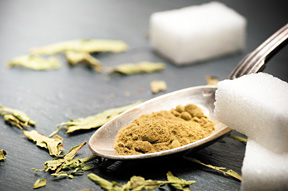Once processed, agave has such a high fructose content that it's almost as bad for your body as high-fructose corn syrup. Although agave has become popular in the past few years as a "natural" sweetener, the question still arises, what is the source? If it isn't the sap taken directly from the leaves, then it should be considered unhealthy.
No Sugar
Many parents might read this and think that regular sugar is acceptable because it's not a chemical and it's not going to cause a chemical reaction in your child's brain. But the truth is that the average child, even with these artificial sweeteners being so prevalent, is consuming more sugar than is healthy.
The average child consumes twice the amount of recommended daily sugar intake and more than 42 percent of the added sugars in a daily diet are from sugary beverages. The childhood obesity epidemic has become a serious concern, resulting in the Federal Trade Commission and the Department of Health and Human Services releasing restrictions on marketing unhealthy food products to children.
Very simply, things that are sweet should be a treat. These are not items that should be consumed daily, and whether it's an artificial sweetener, sugar or even natural sugar from whole fruit, things that are sweet should not be a major part of a child's daily diet.
Natural Sweeteners
 Although it's best to leave things in its natural state, there might be times that you would like to sweeten something, or perhaps you want to bake and need a good sugar substitute. For those times, many wellness practitioners would recommend Stevia. The most natural of all low-calorie sweeteners, this plant is found in South America and has been used in Paraguay for centuries and Japan for decades. As with all sweeteners, the difference is where and how it's produced. Be sure to purchase al-natural Stevia.
Although it's best to leave things in its natural state, there might be times that you would like to sweeten something, or perhaps you want to bake and need a good sugar substitute. For those times, many wellness practitioners would recommend Stevia. The most natural of all low-calorie sweeteners, this plant is found in South America and has been used in Paraguay for centuries and Japan for decades. As with all sweeteners, the difference is where and how it's produced. Be sure to purchase al-natural Stevia.
Natural sweeteners are generally anything that is found sweet in its original form and do not require a chemical reaction to make it so. This does not include "corn sugar," which is just another name for high-fructose corn syrup and is not natural. (Read "Weird Science: When Corn Sugar Becomes High-Fructose Corn Syrup online at ToYourHealth.com for more information.)
Eating items that are chemically created is generally not a good idea. Artificial sweeteners such as saccharin, aspartame and sucralose have been reported to cause various adverse reactions. Furthermore, research is showing that while our taste buds may be fooled by the sweet-tasting, calorie-free treats we're allowing ourselves, our brains might not. Studies have shown that it's possible consuming low-calorie sweeteners may actually cause weight gain by confusing the body's ability to estimate caloric intake and resulting in overindulgence later.
The takeaway for any parent is that a diet rich in whole, living foods is the only way to ensure that you and your children are practicing a healthier lifestyle. A good rule of thumb is, that if it tastes sweet, but has no calories or carbs, you can assume that it chemically created sweetness and should be avoided. Talk to your doctor for more information.
Claudia Anrig, DC, practices in Fresno, Calif., and is on the board of directors of the International Chiropractic Pediatric Association, an organization that can answer your questions regarding the value of chiropractic care during and after pregnancy.

